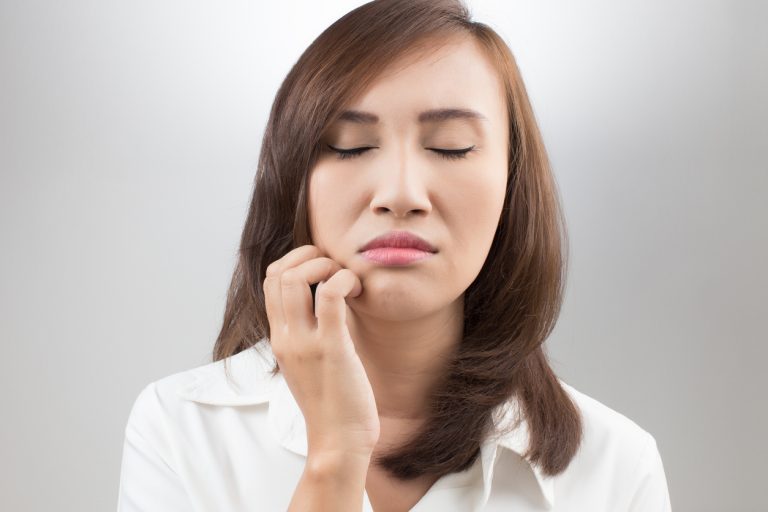Cheek biting happens to everyone at some point in their life. We grab that big sandwich, take a giant bite, and end up chomping on our cheek instead. Most cheek biting is just a minor accident such as this but can become a serious matter when it turns to a habit. Repetitive cheek biting can be an indicator of an anxiety disorder such as obsessive-compulsive disorder and should be monitored by a professional. Habitual cheek biting can cause severe injury and poor oral hygiene as well. Here’s a deeper look into why biting your cheek is bad for you.
Causes
In some cases, chronic cheek biting can be a “BFRB”, or body-focused repetitive behavior. Similar to nail-biting, this behavior becomes habitual and is often driven by anxiety or stress. These habits become very difficult to stop because they are so ingrained in the body as they likely began in early childhood. They can lead to serious problems and should be addressed by a professional. Thankfully, any habit can be shifted or changed so there is hope to dismantle this obsessive behavior.
If you find yourself biting or chewing on your cheek often, take a moment to check in with yourself. What is currently happening in your life? Are your stress levels higher than usual? You could be using cheek-biting as a coping mechanism for emotional overload, stress, or boredom. If you find this is the case, you may want to seek out therapy to find more productive and safe ways to deal with your emotions.
Types
Not all cheek-biting is inherently bad. If you accidentally bite your cheek, you may end up with a canker sore or uncomfortable cut, but it should heal quite soon. However, if you find that you are biting down on your cheek regularly, you may want to get this checked by a dentist. There could a problem with your jaw or teeth alignment causing this to happen.
Many people experience cheek biting while they sleep, similar to teeth grinding. Usually, this is caused by stress or emotional turmoil. Besides managing your stress, it’s very difficult to stop this pattern from happening because you’re asleep. However, the problem can also be resolved by wearing a mouth guard issued by your dentist. Here is an example of a great mouth guard for cheek biting and teeth grinding.
When cheek biting becomes obsessive and habitual, it’s important to seek out the advisory of a psychiatrist. Most of the time, this anxious habit can be replaced with something that’s a little more productive.
The Repercussions
Biting or chewing on your cheek becomes a danger when it happens more than just once in a blue moon. When you bite your cheek consistently, the tissues in your mouth become damaged, causing sores and sometimes ulcers. The spot where one chews their cheek can turn very raw if it is continually bitten which can lead to severe injury of the area. This can be extremely uncomfortable when eating spicy or hard to chew foods. It can also become difficult to talk because of the sores in your mouth.
Besides causing lesions and rawness in the lining of your mouth, biting your cheek habitually can also have detrimental psychological effects. In an article by TLC Foundation, they write, “Psychologically, feelings of guilt, shame, and hopelessness may arise. Social activity can decrease in order to prevent others from observing the behavior.” (link) This then turns into a vicious cycle: the more depressed and anxious you are, the more you chew on your cheek and the more you chew on your cheek, the more isolated and anxious you become.
If you have a problem with biting your cheek, look into its causes. Seek out a professional to evaluate your teeth and jaw alignment with a family dentist in Glendora. You may also want to find a source of mental health help to address any compulsive disorders. There is hope and help out there to get you back to your optimal health.



